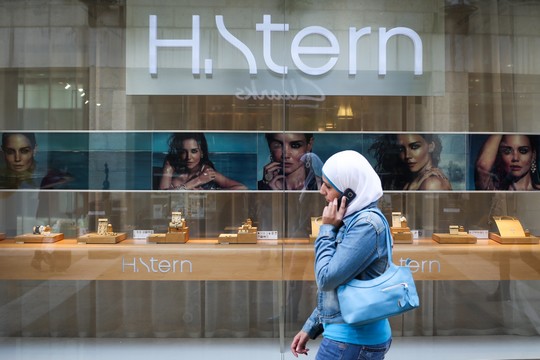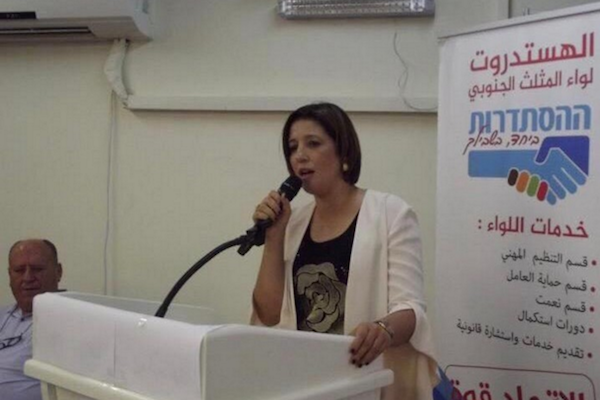Despite the hardships, Arab women are making gains in the Israeli legal establishment, local politics, academia, and even in the Islamic Movement.

I watched as Hollywood stars collectively came out of the feminist closet during the Academy Awards this week. They spoke with pride about the recent #MeToo campaign, and demanded more respect and more funds for films made by women about women.
But why envy the women of Hollywood? There’s enough work to do back home. This past week we also learned that the Israel Prize Committee could not find a single woman who was worthy of receiving the prize, just as an Israeli judicial appointments committee failed in the same seemingly insurmountable task.
Truthfully, as a Palestinian feminist, I don’t care very much about the prize. And yet, as a feminist I still stand alongside Jewish women who demand representation for the vaunted Zionist prize, and wish them success in their struggle to give Israel’s multicultural democracy a facelift.
Nevertheless, it’s worth taking a closer look at my own society — at how Palestinian women in Israel fared in the past year.
A women’s Islamic revolution
Two months ago, the southern branch of the Islamic Movement decided to increase the representation of women on its Knesset slate, including guaranteeing a spot specifically for women, as well as integrating women in its decision-making process. Unsurprisingly, such a dramatic announcement hardly made headlines in either the Hebrew or the Arabic press.
As talk of general elections grows, I decided to see for myself what has changed. It turns out the Islamic Movement has a new party constitution, which was passed overwhelmingly during its last general assembly. And according to the constitution, the fifth and sixth places on the list will hereby be reserved for women.

I asked Islamic Movement spokesperson Mansour Abbas why women are worthy of only the fifth and sixth places.
“Today we are only four representatives in the Knesset. We did not want it to be seen as a woman taking the place of a sitting member of Knesset,” he responded. “This would have led to opposition to the move.”
Before I managed to yell “So what if a woman replaces a man?” he responded: “Women can compete for the first four seats, but the fifth and sixth seats are guaranteed for them. Moreover, the movement decided that it will guarantee a spot for them among the first four seats in the future. The logic behind the move is to avoid conflict with current MKs, in order to save the battle for the future, so that the current MKs and their voters at the general assembly do not block the move.”
While the attempt to protect women in the movement from the dirty business of politics is more than a little patronizing, I told myself that it was better than nothing. Who knows, maybe it is realistic that the first woman with a hijab will enter the Knesset as part of the Islamic Movement in the next elections.
The change, which took me by surprise, was carefully and sensitively coordinated by the brilliant women of the movement, along with a cautious political leadership. Will it actually bode well for the women of the Islamic Movement?
“Yes,” says Maisa Amar, one of the leaders of the Islamic Movement, who has a master’s degree in education and organizational consulting and heads the movement’s early childhood education system. “This is part of a formalization process of what was traditionally accepted. The activities of women in the Islamic Movement are not limited to those in the fields of early childhood, education, and health. It was completely normal to move up the ladder and to strive to make it into politics.”
However, not all Arab women are feminists. Opening the gates for the representation of women allows non-secular women to find their place in politics. Amar is convinced that this step will bring more educated women closer to the corridors of power.
Amar also tells me about her history in the movement, and the support she has received since she began volunteering “by choice,” she emphasizes. “My family was in shock. My father asked me, ‘how will you study and travel in this country with a hijab?'” My experience was the opposite of oppression, she adds. And who am I to argue with an impressive woman who manages dozens of groups and hundreds of employees?
Yes, your honor
This year saw another win for Muslim women with the appointment of Hanaa Khatib as the first female judge on a Sharia court in Israel, trailing behind Palestine, Jordan, Turkey, and Lebanon. The Islamic Movement is sure this was its victory, while women’s organizations, as well as the Justice Ministry (Justice Minister Ayelet Shaked had a feminist field day) celebrated her appointment as their own accomplishment.
The judge herself does not give interviews, and her agenda is unclear. I think that her very late appointment is further evidence for the delay of progress among women in Arab society. It is a revolution that is negatively influenced by the policies of successive Israeli governments, especially when it comes to women’s rights.
I hope that her appointment will usher in a new era for Arab women in the legal establishment, rather than act as a fig leaf meant to shut us up for generations.
‘We’re going for the jackpot’
Arab women are now set to move into local politics. Arab parties will not likely be part of the next national government, so local politics has become more attractive.
There has not been a single female mayor of an Arab city or town in Israeli history, and there are only 10 women on local councils and in municipalities in Arab society. That is about to change.
Women’s organizations have been working for months on promoting representation in local government. The Arab leaders who previously spoke out against women on local councils are nearly extinct, save for a local council leader in Kafr Kana, who ruled last month that his council is for men only. I truly hope that this dinosaur does not win the next elections, and if he does, that he faces a table full of women.
Maisam Jaljuli, who won the last elections for the Histadrut labor federation on behalf of Hadash as the chairwoman of Arab feminist organization, Na’amat, is especially active on this issue, and travels from village to village to speak about its importance. She is part of a coalition of organizations that came together to change the status quo (full disclosure: I head the organization No’am, which is part of the coalition). We decided on the campaign slogan: “Your voice — your power.”

“This time, as usual, local elections will be held according to ‘family purity,’ says Jaljuli. “That is why the exclusion of women will continue. Women don’t have a leadership position in the family, which preserves its patriarchal structure. The political parties continually grow weaker in the face of the families, and some of the local branches even build coalitions with them.” Jaljuli believes that in order to break through the family barrier, women must establish an independent slate that will run in the elections, thus undoing the status quo.
And yet, there have been gains. In Maghar, the Arab-Jewish Hadash party elected a woman to lead its list for elections, setting an important precedent that could serve as an example for other towns. In the Negev Desert, women created two models meant to break into local politics. First, by establishing women-only lists to go from home to home to speak about the issue. Muna Habanin, an activist from the Bedouin township of Rahat, is behind the initiative and is well aware of the power of the men in her community. Yet women must start from somewhere. “The model of begging men to put us on their list in an unrealistic spot, all for decoration, is neither realistic nor good enough. This time we’re going for the jackpot,” she says.
The second strategy is being led by feminist organization Itach-Maaki, which is trying to establish a women’s council in Bedouin society.
In Israel’s north, Mirada Hasson has established a new list in the Druze village of Dalyat al-Carmel. Hasson, 57, began her activism in issues dealing with both early childhood and regular education. She quickly realized that in order to receive funds, she would need connections, and in order to build connections she would need to go into politics.
For Druze society, this sounded like the story of Joan of Arc. She was convinced not to run for the sake of the family and the village. “This time it won’t happen,” she declares. “I will not elect my brother or my uncle, only that which is good for me and for the women of the village.”
How does she intend to this? “I established a list by myself. It is a list for men and women, but I stand at its head and men are welcome to join. I established facts on the ground and I do not intend to give up. Soon enough, they began negotiating with me. Even if we do not win — and I do believe we will be elected to the council — it will be enough to show that women are willing and able. Most of my supporters are young people from the next generation who understand that a change is necessary.”
The elections to the local elections will take place in seven months; many things are expected to happen until then: deals and struggles, victories and disappointments. But one thing is clear to every person with whom I spoke: Arab women are on the way to local municipal and town councils.
The path to academia
The number of Arab women in academia leaped by nearly 50 percent over the past few years, and there is hardly a singly academic institution that has not invested a great deal of money in its Arab students. The number of young Arab women in academia has risen every year, and today constitutes 58 percent of undergraduates. How did this happen?

Over the past 20 years there has been a steady increase of Arab women in academic institutions, but the biggest push came following a change in Israeli policy. In 2010, the government established a new goal: by 2020, the employment rate among Arab women aged 25-64 would be 41 percent. Today it is only 34 percent. Among college-educated Arab women, that rate is 75 percent, which means we can expect an increase in employment rate for Arab women across the board. After the best economists explained to the politicians that investing in Arab women is a national interest, 60 years of “traditional, social, and cultural barriers” turned into a detailed work plan that would bring more Arab women to academia.
Hadash MK Yousef Jabareen, a member of the Knesset Education Committee, explains the phenomenon:
Arab women have been carrying out a revolution in academia, where their numbers are growing, over the past few years. Will will see the fruits of this revolution, and its positive effects on Arab society in the near future, both in terms of contributions to the Arab society and economy, and in terms of their integration into positions of influence. As more young Arab women become integrated and become more independent, I expect to see more reactionary forces in Arab society. Thus, we must give them all the support necessary in the face of attempts to pull them backwards.
It’s hard to argue with numbers: 25 percent of college-educated women Arab are unemployed, and even a degree isn’t enough to solve the problem of a racist labor market that is not yet ready to accept thousands of Arab women. But this too will be overcome once the labor market is no longer able to exist without fmeal Arab researchers, pharmacists, doctors, engineers, and scientists.
I wish a happy and successful International Women’s Day to all, in which we remember and celebrate our victories. Our struggle as women in this world is not over. We have many arenas in which to sound our voices, to determine what we want and which direction to walk. The struggle over our bodies, sexuality, safety, livelihood, and culture is still in full swing, and it does not matter in what language we choose to wage it.
This article was first published in Hebrew on Local Call. Read it here.

